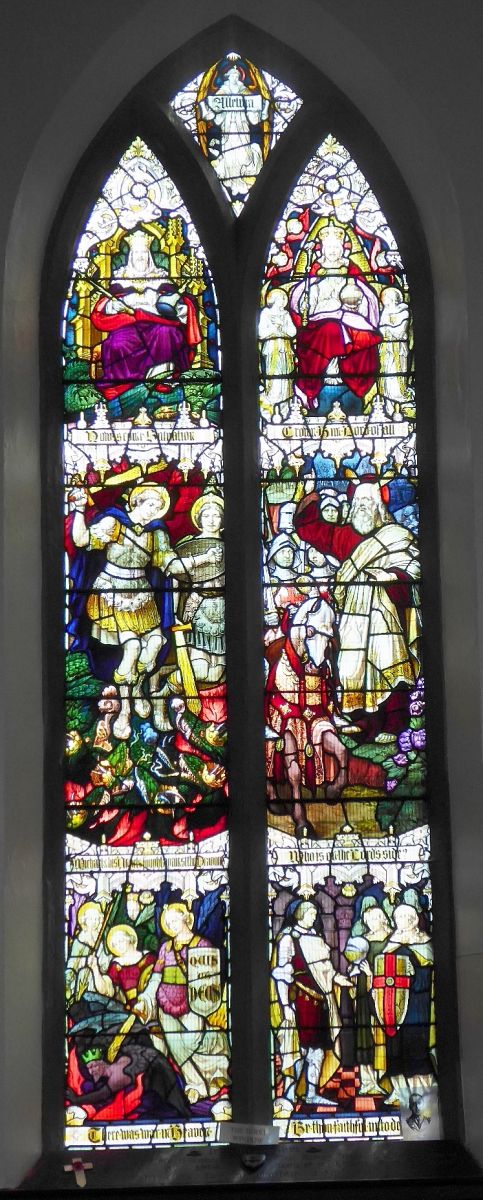 Whitechapel Church, Cleckheaton remembered the two sons of a former vicar who were killed in the Battle of the Somme last Sunday.
Whitechapel Church, Cleckheaton remembered the two sons of a former vicar who were killed in the Battle of the Somme last Sunday.
The Rev T D Hyde lost sons, Charles and Eustace, during his time as vicar of Whitechapel between 1893 and 1926.
Whitechapel’s current vicar, the Revd Brunel James said: “We all need healing in our lives, and today I wanted to reflect briefly on a different dimension of healing - the way that the wounds of history impact on families and communities, and generate strong emotions which pass down the generations and to touch on the story of the Hyde family”.
Lt Eustace Emile Hyde, 4th Royal Irish Fusiliers was killed in action 12th October 1916, age 23 and is buried AIF Burial Ground, Flers, Somme, France, about one mile where he fell.
Eustace Hyde joined the Leeds Pals Battalion of the West Yorkshire Regiment as a Private soon after the outbreak of the war. After gaining his commission in the Royal Irish Fusiliers he became Musketry Instructor to the Battalion, and went to the front three months before his death. He was shot dead by German machine gun fire on the enemy parapet while gallantly leading his platoon into action at Lesboeufs. The fire was so intense that his comrades could not recover his body.
A former pupil of Bradford Grammar School, he held a responsible position with the Bradford Dyers Association, based at the nearby Hunsworth Dyeworks.
Said Brunel: "It must have been a terrible blow to the family to lose two of their three sons during the Battle of the Somme, but Revd Hyde carried on bravely and was involved in many, what must have been very painful, services of remembrance both during and after the war."
Second Lt Charles Stewart Hyde, 16th West Yorkshire Regiment (1st Bradford Pals) was killed in action on the opening day of the battle, 1 July 1916, age 25 and is listed on the Thiepval Memorial to the Missing, Somme, France.
Charles Hyde, Eustace's brother, had no known grave as his body was never found.
Said Brunel: "It is gratifying to see that their parents added an inscription to Eustace's gravestone commemorating Charles: "Also in loving memory of 2nd Lieutenant Charles Stewart Hyde.""
Soon after the outbreak of war Charles Hyde joined the Leeds Pals with his brother Eustace, as a private soldier. He was commissioned into the Bradford Pals Battalion and went with them to Egypt in late 1915, before arriving on the Somme in the spring of 1916. The 1st July 1916 was the blackest day in British Military History when twenty thousand men were killed and another thirty-seven thousand wounded, mostly within minutes of leaving their trenches. The Bradford and Leeds Pals were almost completely annihilated in front of the fortified village of Serre at the north of the Somme battlefield. A letter to the family from a colleague states that he was leading his platoon over the top and he was wounded in the arm and leg before he had gone a hundred yards. He would not go back and stated that "he would see the job through." Eventually his leg was bound and he was dragged to a shell-hole; but while sitting there with two other wounded soldiers, encouraging his men, a shell exploded, killing them all instantly. What was left of his body was never found, and thus he is commemorated on the Thiepval Memorial to the Missing.
A former pupil of Bradford Grammar School, he joined the staff of the Union of London and Smiths Bank in branches in Cleckheaton, Dewsbury and Leeds. He, like his brother, was involved with Whitechapel Church where their father was the vicar.
Both brothers lived at Whitechapel Church Vicarage, Cleckheaton and are commemorated on the memorials at both Whitechapel and St John's Churches, and at Bradford Grammar School.
Pictured here is the stained-glass window in their memory which was put in Whitechapel Church at the end of the war ( paid for by subscriptions from the parishioners)
Spenborough Branch Chairman, Eddie Morton said “It is good that Whitechapel took the opportunity remember this family and the sacrifices made in this infamous battle. The battle started on the 1st of July 1916, which became known as the blackest day in British military history, on that day 22 men from the Spen Valley lost their lives”.
Mr Hyde’s service, and his last Sunday at Whitechapel, is recorded in an article in the local newspaper, Spenborough Guardian of Friday 5th November 1926.